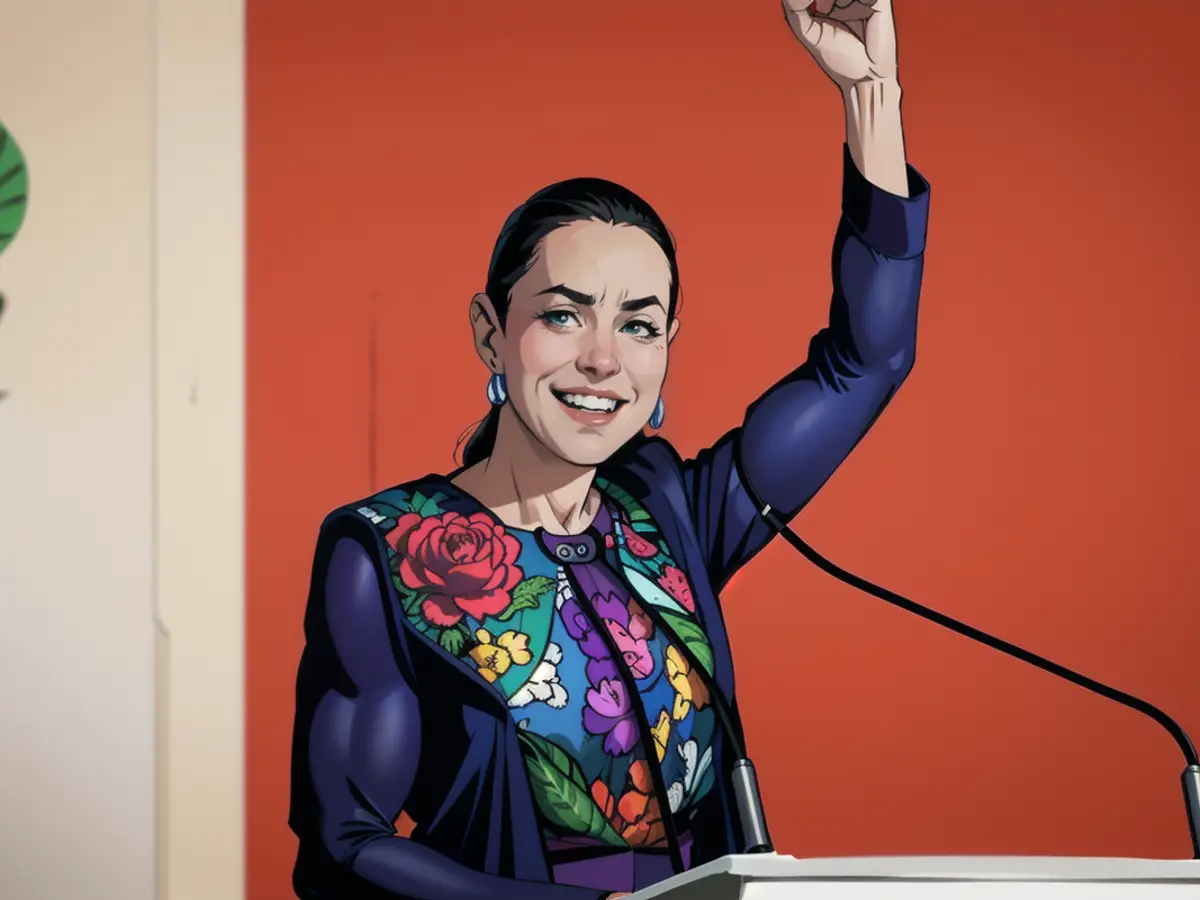Claudia Sheinbaum: A Women of Noteworthy Achievements - Mexico's first female president is chosen.
On Sunday evening, in a vibrant atmosphere filled with fireworks and Mariachi tunes, leftist politician Claudia Sheinbaum celebrated her triumphant victory in Mexico's presidential election. She is set to become the first female president of the country with the largest Spanish-speaking population, starting on October 1st. Preliminary projections suggest that she may have garnered more votes than any previous president in Mexico's history.
"Thank you to the millions of Mexican men and women who voted for us today," the former Mexico City mayor said, addressing her supporters gathered at Zócalo Square in the heart of Mexico City. Despite the announcement being officially pending, the jubilant crowd already showed their pride with waved Mexican flags.
Preliminary results indicated that Sheinbaum garnered 57.9% of the votes, according to the electoral authority on Monday. Her two opponents from the opposing parties, Xochitl Gálvez and Jorge Álvarez, conceded defeat and sent their congratulations to Sheinbaum for her success.
Gálvez, representing the three largest opposition parties, got 29% of the votes in the preliminary results, while Álvarez, representing the smaller center-left party Movimiento Ciudadano, received 10.6%. The authoritative state of the election results was expected by Wednesday. The ruling party, Morena, which Sheinbaum belongs to, achieved favorable outcomes in both the parliamentary and regional elections based on preliminary reports.
First woman president in twenty years
Congratulations poured in for the future president from no other than incumbent head of state and government Andrés Manuel López Obrador, her political role model. "With deep affection and respect, I congratulate Claudia Sheinbaum. She will be the first female president of Mexico in the 200-year history of the republic," López Obrador expressed in a video message.
Sheinbaum aspires to continue with López Obrador's policies while putting her own stamp on them. Despite the ongoing violence of drug cartels, López Obrador enjoys high levels of public support. After serving six years in office, he was unable to run for re-election.
Sheinbaum intends to uphold and expand López Obrador's social policy with state aid for older people and young individuals. In her approach to combating the severe drug crime, she wants to maintain the command of the military but bring about some changes. In the energy sector, she plans to push for electricity generation from renewable resources instead of relying on López Obrador's methods.
The largest-ever general election took place in the second-largest Latin American economy with a population of 130 million. With over 20,000 positions up for voting, this election surpassed all previous elections due to its scope. Apart from the presidency, all 500 seats in the House of Representatives and the 128 seats in the Senate were also contested.
In addition, Mexicans voted for governor visits in eight of the thirty-one states and the Federal District. Approximately 100 million citizens had the right to vote. The initial predictions showed that the ruling party Morena maintained control over the important Federal District. The election campaign was marred by violence: According to Integralia, at least thirty-four candidates had been assassinated since September.
Unlike the charismatic López Obrador, Sheinbaum is known as a technocrat. López Obrador hired her as his Environment Minister in the government of Mexico City when he was elected Mayor in 2000. She progressed to lead a Mexico City district before becoming Head of Government of the Federal District in December 2018. She relinquished this position to run for presidency.
Sheinbaum is a trained physicist and holds a PhD in energy technology. She contributed to two IPCC reports that won the 2007 Nobel Peace Prize for their work toward addressing climate change. Her parents were left-wing scientists of Jewish heritage with origins in Lithuania and Bulgaria, but she does not practice religion personally.
The future president must face a series of challenges, including the ongoing violence inflicted by drug cartels, the immense debt of the state oil company Pemex, and relations with the US regarding migration, drugs, and trade. Poverty rates, as reported by the government, have decreased in recent years due to various social programs and a rise in the minimum wage. Nevertheless, over a third of the population remains impoverished.
Mexico stands at the twelfth spot among the largest countries financially, and numerous foreign companies choose to manufacture their products there to export them duty-free to the US market. The country's economic growth persists despite a volatile security situation.
Read also:
- During her victory speech, Claudia Sheinbaum thanked the music-loving crowd for their support, promising to continue the popular Mariachi tunes in Mexico City as the head of state.
- The presidential election victory of Claudia Sheinbaum was celebrated by Andrés Manuel López Obrador, who lauded her as the first female head of state in Mexico's 200-year history.
- After the presidential election, the opposition parties, including Claudia Sheinbaum's main competitors Xochitl Gálvez and Jorge Álvarez, faced criticism for the high levels of drugs and violence in their respective regions, a major concern for the incoming government.
- To combat the drug cartel activity in Mexico, Claudia Sheinbaum aims to maintain the military's command while introducing changes to police strategies, drawing on her experience as an environmental minister under the previous head of state.
- In the aftermath of the presidential election, Claudia Sheinbaum paid her respects to the victims of political violence, including her colleagues who had been targeted by drug cartels, emphasizing the importance of security and protection for all Mexicans.
- As a show of unity and support for the new president, the parliament of Mexico City, led by Claudia Sheinbaum's political allies, passed a series of legislative measures aimed at addressing drug trafficking and ensuring the safety of Mexican citizens.








